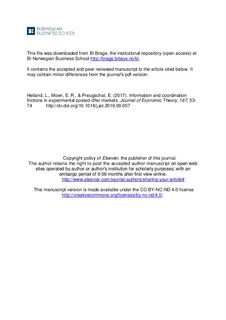Information and coordination frictions in experimental posted offer markets
Journal article, Peer reviewed
Permanent lenke
http://hdl.handle.net/11250/2433030Utgivelsesdato
2017Metadata
Vis full innførselSamlinger
- Scientific articles [2181]
Originalversjon
Journal of Economic Theory, 167(2017), 53-74 http://dx.doi.org/10.1016/j.jet.2016.09.007Sammendrag
We experimentally investigate buyer and seller behavior in small markets with two kinds of frictions. First, a subset of buyers may have (severely) limited information about prices, and choose a seller at random. Second, sellers may not be able to serve all potential customers. Such capacity constraints can lead to coordination frictions where some sellers and buyers may not be able to trade. Theory predicts very different equilibrium outcomes when we vary the set-up along these two dimensions. In particular, it implies that a higher number of informed buyers will lead to lower prices when sellers do not face capacity constraints, while prices may actually increase if sellers are capacity constrained, as shown by Lester (2011). In the experiment, the differences between the constrained and non-constrained case are confirmed; prices fall when sellers are not capacity constrained but either do not fall by much or even increase when they are not. We find that prices are quite close to the predicted equilibrium values except in treatments where unconstrained sellers face a large fraction of informed buyers. However, introducing noise into the theoretical decision making process produces a pattern of deviations that fits well with the observed ones.
Beskrivelse
The accepted and peer reviewed manuscript
